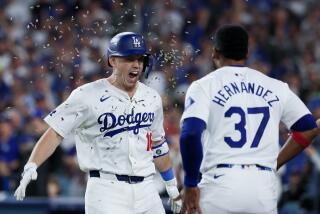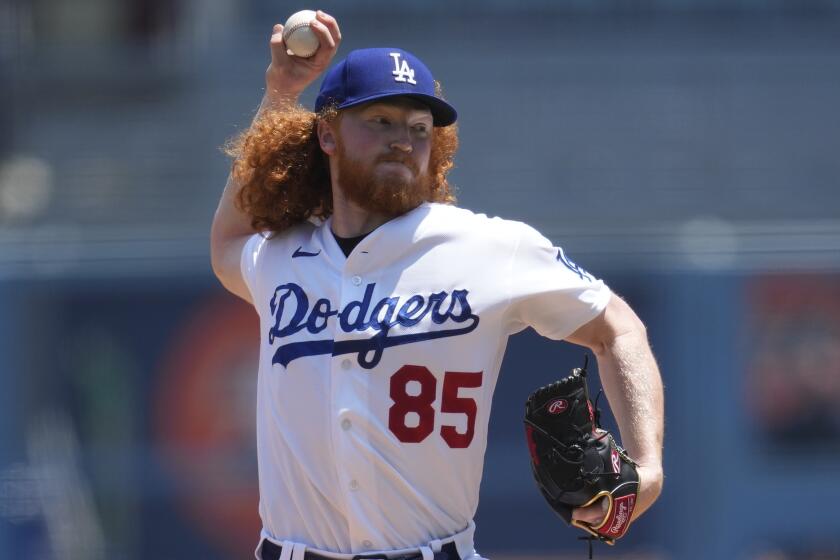Dodgers Play Their Last Ace and Win : Hershiser Saves It in 12 After Gibson Gives L.A. a 5-4 Lead
NEW YORK — Adversity, it seems, becomes the Dodgers. You can take away their best relief pitcher, inform them of all the things going against them and read them derisive comments from opponents, and all it does is fuel their resolve.
Sunday night against the New York Mets, in Game 4 of the National League championship series, the Dodgers seized upon what many perceived as a devastating loss, reliever Jay Howell’s 3-day suspension, and, somehow, some way, turned it into an improbable 5-4 victory in 12 innings over the Mets.
To even the playoff at 2 victories each, the Dodgers needed a towering bases-empty home run struck by a heretofore quiet Kirk Gibson long after midnight struck. Gibson, who had only 1 hit in his previous 16 at-bats in this playoff, deposited Roger McDowell’s pitch 400 feet over the right-center field fence.
The Dodgers also needed to use 7 of the 8 pitchers available to finally secure the victory. Orel Hershiser, the starting pitcher in Game 1 and Saturday’s Game 3, was called upon with the bases loaded and 2 out in the bottom of the 12th inning to try to close out the win.
Hershiser, who made 110 pitches Saturday but had volunteered for relief duty before the game because of Howell’s absence, needed only 3 pitches to force Kevin McReynolds to fly out to shallow center field to end it.
After center fielder John Shelby--who missed catching a similarly shallow-hit ball that gave the Mets a victory in Game 1--made the running catch, Dodger players sprinted from the dugout and embraced each other as if it was the deciding game of the series.
Although it was only the fourth game, and the teams must return to Shea Stadium less than 12 hours after the final out for Game 5 today at 9:08 (PDT), the Dodgers certainly seemed to have a right to celebrate.
It took everything the Dodgers had to win. All the Dodger pitchers at the ballpark were used. Tim Belcher, today’s starter, and Howell watched the game from the team’s hotel. Belcher will face Met left-hander Sid Fernandez.
Before Sunday night’s game, Manager Tom Lasorda assembled his players for one of his more emotional meetings in memory. The subjects included the loss of Howell, the pine tar incident and the 2 games to 1 deficit in the series.
“I told them they’ve been a team of character, a team of strength,” Lasorda said. “I told them we had lost Jay Howell and our backs were against the wall again.
“But I said to them, ‘You are going to play with determination. You’re going to bounce back like you did all year.’ And I’ll be damned if they didn’t do it again.”
Just as they did in Game 2, when they rallied after Met pitcher David Cone criticized them in print, the Dodgers, especially the relief corps, rallied to once again even the series.
Until the 12th inning, when the Dodgers were forced to use Tim Leary and Jesse Orosco, 3 Dodger relievers combined to shut down the Mets. Alejandro Pena, Saturday’s loser, pitched 3 hitless innings to earn the win. Hershiser, the surprise reliever, got the save.
“The way it came down, that (decision to suspend Howell) really hurt us a lot,” Gibson said. “It really, really hurt us. I wore a JH on my sleeve out of respect for Jay. Losing him really, really hurt us, but I wanted him to know he didn’t let us down.”
It was Gibson’s blast that finally made all that good relief pitching count for something. Gibson’s motivation might have been a little different than the relief corps and other teammates.
He had been struggling all series at the plate, but against McDowell, he smashed a slider off a potato chip sign in right-center. It was Gibson’s first home run since Sept. 11.
“I figured it was about time,” Gibson said. “I’ve been terrible. This is a trying time. I’ve been thinking a little too much at the plate.
“You got to tell yourself that there are moments like this you dream about, and I wanted to have an impact on the game.”
Gibson was not the only Dodger to have an impact.
Talk about a group victory.
Among the most notable contributors were the entire bullpen and catcher Mike Scioscia, who sent the game into extra innings with a highly improbable 2-run home run off Met starter Dwight Gooden in the ninth inning.
Scioscia began this turn of events with a line-drive home run that landed in the Mets’ bullpen. The most surprised person in the stadium seemed to be Scioscia, and he would say so later.
“The last person you would think would hit a home run would be Scioscia,” Met Manager Davey Johnson said.
Scioscia had averaged less than 1 home run a month during the regular season. His last came Sept. 13 against Atlanta Braves pitcher John Smoltz. Gooden, however, is not some Smoltz just up from the minor leagues.
“I was hoping no one in the Mets’ bullpen would catch the ball, because maybe they’d call me out or something,” Scioscia said. “The guys in the dugout were kidding me about my home-run trot, but I told them I was running as fast as I could.”
Levity was pervasive in the Dodger clubhouse afterward. But even before a game critical to their World Series hopes, the Dodgers showed flashes of humor when dealing with the loss of Howell.
Howell may have been gone, at least temporarily, but he was not forgotten among his pitching comrades.
In an overtly symbolic gesture, starter John Tudor took the mound to start the game having scrawled “JH” on his left sleeve. Gibson and selected other Dodgers also donned the moniker. After Tudor, in his first start in more than a week because of a right hip injury, left in the sixth inning having allowed 4 runs, the Dodger bullpen saluted their missing reliever by turning in their most impressive group show of force this season.
First, middle reliever Brian Holton made his first appearance of the playoffs and extricated Tudor from the sixth-inning jam.
Next came left-handed reliever Ricky Horton, acquired by the Dodgers for the expressed purpose of facing the Mets’ left-handed hitters. Horton retired the side in the seventh, including switch-hitting Gregg Jefferies and left-handed hitting Keith Hernandez.
Then, in the most impressive bullpen showing, Pena kept the Mets hitless for 3 innings. Pena, the losing pitching in Game 3 after replacing the ejected Howell without benefit of proper warm-up time, walked 3 Mets but worked out of each jam.
In the 12th, Leary recorded 1 out but gave up 2 singles and was replaced by Orosco, who promptly walked Hernandez. But Orosco forced Darryl Strawberry to pop to second, and then Lasorda went to Hershiser.
Relief appearances by Hershiser are not unprecedented. On May 10, in a 12-inning game in Chicago, Hershiser pitched a scoreless relief inning to earn a save.
Against Gooden, Gibson had struck out twice and meekly grounded out twice. Then, against left-handed reliever Randy Myers in the 10th inning, Gibson again grounded out.
There was little to suggest that Gibson’s at-bat against McDowell in the 12th inning would be different. When Gibson faced McDowell in Game 3, he hit a routine fly ball to center. McDowell, who had replaced Myers with 2 out in the 11th inning, had retired Steve Sax and pinch-hitter Franklin Stubbs for the first 2 outs.
Up came Gibson, who strikes an imposing figure at the plate even when he is not hitting well. McDowell’s first pitch was a sinker for a strike.
McDowell’s next sinker rose and flattened out over the plate. To use Gibson’s term, he pounced on the pitch. It hit the potato-chip sign a few feet under where it reads “Simply Delicious.”
That was the Dodgers’ sentiment, exactly--not only about Gibson’s home run, but the victory itself.
All the way from the dugout, up the tunnel and into the clubhouse, the Dodgers were rampantly cheering and chanting. Lasorda pumped both arms over his head and yelled, “What a . . . team,” at least 5 times.
But when the night began to unfold, it had looked as though the Dodgers would once again fold.
For the fourth straight time in this playoff series, the Dodgers scored first. But, for three of those games, the Dodgers had lost.
Sunday night, the Dodgers used their standard means to manufacture a 2-0 lead off Gooden in the first inning.
Sax led off with a chopping ground ball down the third baseline. Gregg Jefferies, the Mets’ rookie third baseman, charged the ball but had trouble gripping it. He made no throw, and Sax had an infield hit.
Knowing that the offense has been sputtering, Lasorda did not hesitate to send Sax. He easily stole second as Gooden worked slowly out of the stretch and Carter slowly unloaded the throw. Mickey Hatcher then walked, the first of 5 that Gooden would issue. The runners each advanced a base on Gibson’s grounder.
Then Gooden appeared to be take control. He struck out Mike Marshall on 3 pitches and threw a strike on his first pitch to Shelby. But Shelby then slapped a broken-bat single to right, scoring Sax and Hatcher for a 2-0 lead.
Those would be the last runs the Dodgers would score against Gooden until the surprising ninth-inning uprising. In the meantime, Gooden was dominating and Tudor was shaky.
Tudor started to come undone in the fourth. Hernandez began the rally with a bloop single to center. One pitch later, Strawberry sent a fastball rocketing deep into the Mets’ bullpen in right field. In an instant, the Mets had tied it, 2-2.
As is his custom, Tudor stalked the mound, mumbled to himself and shook his head. If Tudor appeared upset by Strawberry’s home run, the third he had allowed in postseason play, he was livid at himself 2 pitches later.
That’s because McReynolds, emerging from a severe hitting slump, deposited a Tudor pitch over the 371-foot sign in left field to give the Mets a 3-2 lead.
More to Read
Are you a true-blue fan?
Get our Dodgers Dugout newsletter for insights, news and much more.
You may occasionally receive promotional content from the Los Angeles Times.






